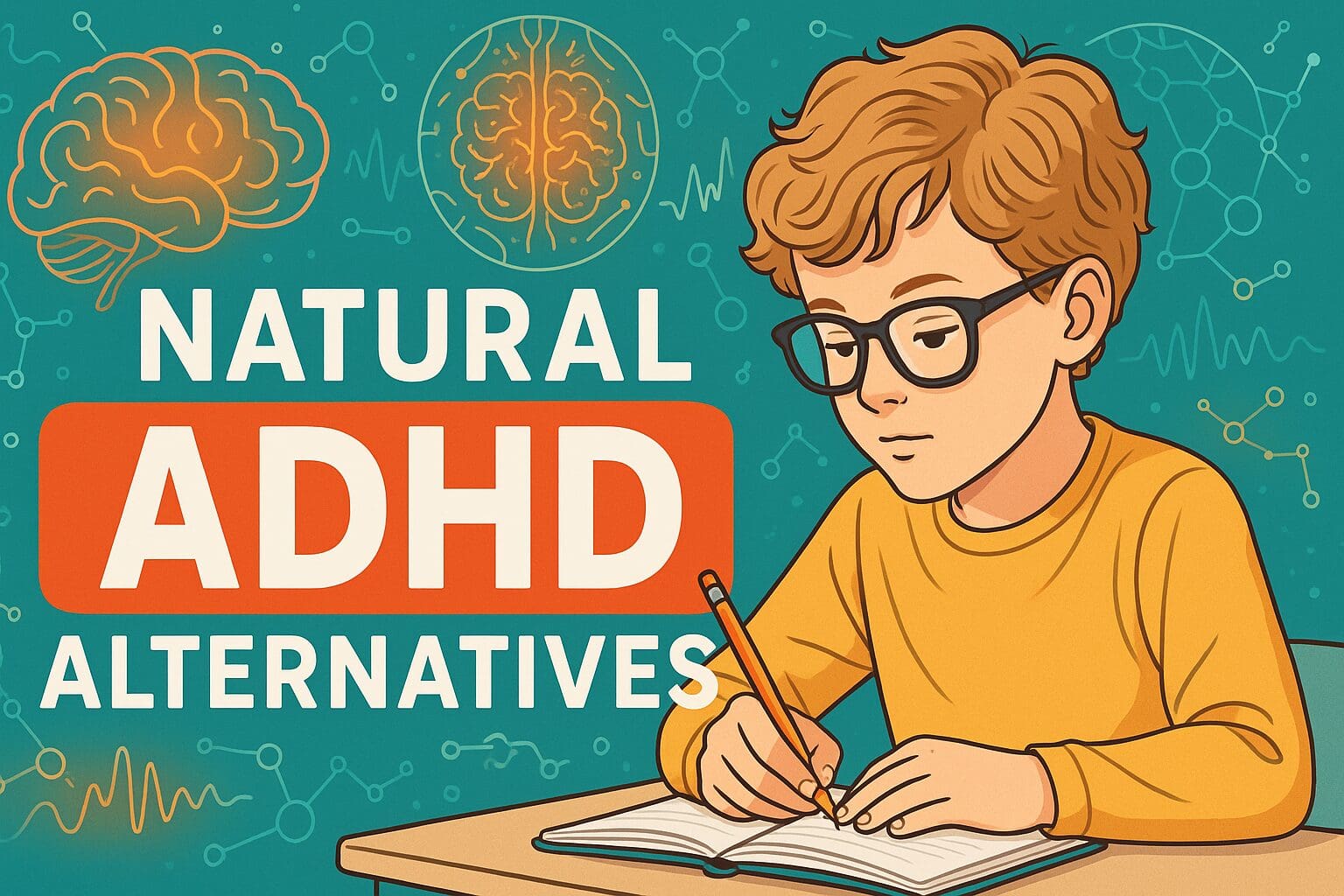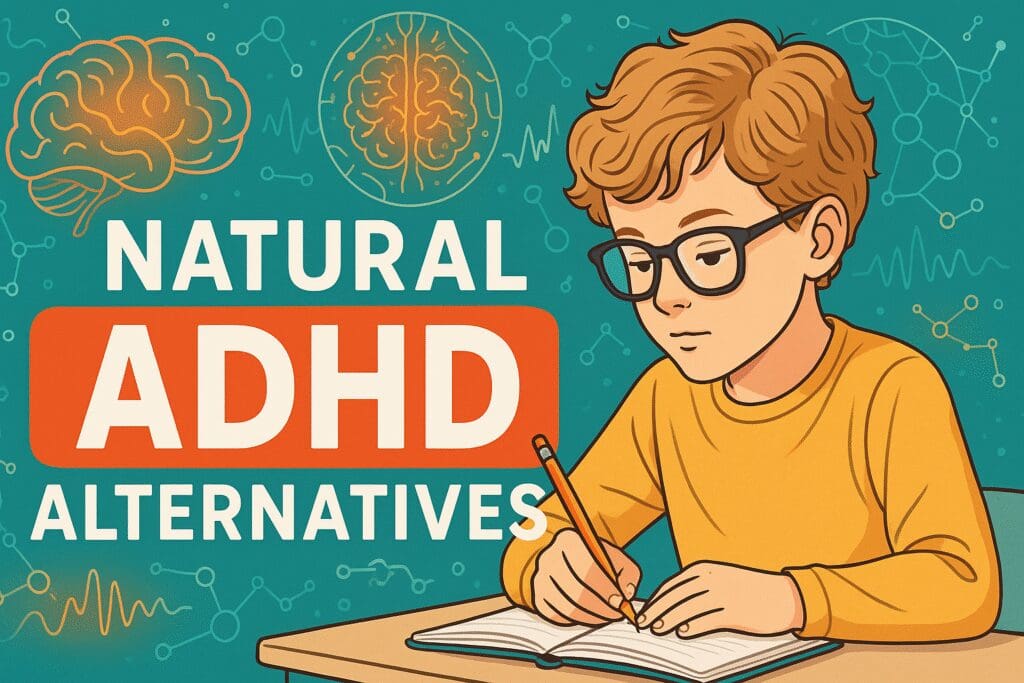If you’re searching for natural alternatives to Adderall for your child, you’re not alone—and you’re not wrong for wanting something different.
Here’s The Real Struggle Parents Are Facing
Every fall, as backpacks are zipped and alarms are set, many parents face a difficult truth: school feels harder than it should for their child.
It’s more than just forgetting homework or fidgeting in class. It’s watching your child crumble under simple tasks. It’s the battles over bedtime and meltdowns after school. It’s the quiet dread of another phone call from a teacher saying, “Your child is struggling to stay focused.”
Then comes the suggestion many parents hear: “Maybe they need Adderall.”
But something inside you pauses.
You want your child to thrive. But not at the cost of their spark.
The Growing Push Toward Medication
ADHD diagnoses are rising fast—and so are the prescriptions.
For many families, the moment a diagnosis is made, stimulant medication becomes the default first step. Sometimes it’s helpful. But often, it’s handed out without asking deeper questions: How’s their sleep? Could food sensitivities or past trauma be playing a role? Is their brain overwhelmed or underactive?
In some cases, medication becomes a stand-in for understanding. And that’s where concern begins.
Because this isn’t just about medication. It’s about making sure your child gets what they actually need.
Why Medication-First Isn’t the Full Story
Stimulants like Adderall can absolutely help some children concentrate better. But for many others, they come with a cost:
Decreased appetite
Trouble falling or staying asleep
Emotional ups and downs
Increased anxiety or irritability
Long-term dependency risks
Parents describe their once-bright child becoming withdrawn, flat, or unrecognizable. And for some, the dosage keeps rising while the benefits level off—or disappear altogether.
Even more concerning? Many kids are placed on medication after a brief questionnaire, with no deeper look into how their brain is actually functioning.
That’s not care. That’s convenience. And our kids deserve better.
ADHD is real. But so is the risk of treating it without truly understanding it.
Why We Start With the Brain
At Genesis Brain Institute, we believe the best treatment plans begin with clarity.
Not guesses. Not labels. Real data.
Every child’s brain is wired differently. Some are stuck in high-alert mode, unable to calm down. Others are drifting through fog, struggling to stay on task. Until you see what the brain is doing—you’re just hoping something helps.
Step One: qEEG Brain Mapping
We start with a quantitative EEG—a non-invasive scan that shows us how the brain is operating in real time. Are areas overactive? Under-functioning? Are different brain regions talking to each other the way they should?
This scan gives us a map—a GPS to understand why your child feels distracted, anxious, or unmotivated.
Step Two: A Full Diagnostic Workup
Beyond brainwave data, we run a full set of brain diagnostic tests to make sure nothing’s being missed:
Pupilometry to measure stress and brainstem function
Vestibular and Balance Testing to assess coordination and motion processing
Eye Movement Testing to evaluate visual tracking and reading fluency
Cognitive Performance Testing to examine attention span, processing speed, memory, and decision-making
We combine all of this with a one-on-one review by a Functional Neurologist who helps build a clear, custom treatment plan—not just for symptoms, but for your child’s actual needs.
We Don’t Medicate the Brain. We Re-Train It.
Once we understand what’s going on, we begin to guide the brain toward healthier function—naturally.
First, Fuel the Brain
We often start with Hyperbaric Oxygen Therapy (HBOT treatment)—a gentle, non-invasive treatment that delivers pure oxygen to the brain in a pressurized chamber. This improves circulation, reduces inflammation, and gives underperforming areas of the brain the energy they need to heal and grow.
When the brain has fuel, every therapy that follows becomes more effective.
Then, Train the Brain
Neurofeedback
Using real-time neurofeedback, we train the brain to shift out of chaotic or sluggish patterns. Kids play games, watch movies, or listen to music that only continue when their brain is producing healthier activity.
Over time, the brain learns how to stay in focus, calm itself, and regulate emotions—without outside intervention.
VR Biofeedback
Virtual reality brings learning to life. Kids enter immersive experiences where calming their body, breathing deeply, or focusing their mind helps them complete adventures.
It’s not only fun—it teaches real-world skills they can carry into the classroom, home, or social settings.
Other Tools We Use—Only When Needed
Depending on your child’s brain map and results, we may use additional therapies such as:
Photobiomodulation – red/infrared light to reduce brain inflammation
Vestibular Training – supports coordination and spatial awareness
Sensory Integration – helps children better process sound, touch, and movement
Visual-Motor Training – improves reading, focus, and eye-brain coordination
Brainwave Entrainment – uses gentle sound/light to balance mental rhythms
Cranial Nerve Stimulation – promotes nervous system regulation
Custom At-Home Protocols – reinforce gains with breathing, games, or routines
Every tool is chosen for a reason: because your child’s brain showed us it was needed.
Who’s on Your Child’s Team?
This isn’t a one-provider clinic. Our integrated brain team works together to support your child from multiple angles:
Board-Certified Pediatricians
Neurosurgeons
Mental Health Counselors
Functional Neurologists
Cognitive & Rehab Specialists
And we don’t just build a plan and walk away. We test, adjust, and test again.
Because real healing isn’t static—it evolves.
Other Natural ADHD Alternatives You Can Explore Now
Looking for drug-free ADHD options to start today? Here are some well-studied supports parents are using:
Behavioral Parent Training (BPT) – coaching for better structure and behavior tools
Omega-3 Fatty Acids – especially EPA-rich fish oils to support attention
Physical Activity – movement boosts executive function and focus
Mindfulness & Breathwork – great for emotional regulation and calming
Diet Changes – removing dyes, sugars, or common irritants can reduce symptoms
Brain Training Tools – apps or coaching programs that support memory and task focus
Used together—or alongside a brain-based program—these can make a big difference.
What to Do Before School Starts
Here’s what we recommend every parent do before the first bell rings:
Track your child’s sleep, stress, behavior, and focus patterns
Rule out hidden issues like vision problems, trauma, or sensitivities
Meet with the school to ask about 504 Plans or IEP accommodations
Schedule a qEEG Brain Map to uncover what’s really happening
You don’t need to wait until your child is falling behind—or melting down—to take action.
Natural Alternatives to Adderall: Hope for a New School Year
You want your child to succeed. You want them to feel confident, connected, and calm.
Maybe you’ve tried strategies. Maybe you’ve even tried medication. Or maybe, you’ve just been holding on—hoping this year will be better.
There is another way.
You don’t have to guess. You don’t have to settle. And you definitely don’t have to go through this alone.
If you’ve ever whispered to yourself, “There has to be something else,”—you were right.
Let this be the year you find it.
👉 Schedule your child’s qEEG Brain Map today.
Disclaimer: This content is for informational purposes only and does not constitute medical advice. Please consult with a licensed healthcare provider. Genesis Brain Institute is a Brain Treatment Center in Tampa offering non-pharmaceutical solutions that bring clarity, restore function, and offer real hope for those who feel lost, stuck, or simply want more from life.


